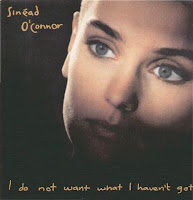I Do Not Want What I Haven't Got
 Wow. Twenty years ago tomorrow Sinead O'Connor's album, I Do Not Want What I Haven't Got, was released. I must have bought it only a day or two later. Where has the time gone? Thinking about this record takes me back, as some co-workers and I shared an enthusiasm for O'Connor, going to see her in concert at the Beacon Theater and marveling at her talent and propensity for putting herself out naked for the world to gawk at.
Wow. Twenty years ago tomorrow Sinead O'Connor's album, I Do Not Want What I Haven't Got, was released. I must have bought it only a day or two later. Where has the time gone? Thinking about this record takes me back, as some co-workers and I shared an enthusiasm for O'Connor, going to see her in concert at the Beacon Theater and marveling at her talent and propensity for putting herself out naked for the world to gawk at.I had been an admirer of her first record, The Lion and the Cobra, but her sophomore effort took the music world by storm. It hit number one in several countries, and the single and video, Prince's "Nothing Compares 2 U," made her a mega-star. The iconic video, directed by John Maybury, does not deviate from a close-up of her angelic face, pouring her heart out over a lost love (for Prince, it was a girlfriend, but for O'Connor it was something more complicated). That song was the only one on the record that O'Connor didn't write, but she did produce it, along with Nellee Hooper, and the gorgeous string accompaniment works perfectly with her soulful voice. Only the most stone-hearted can't be moved by it.
As fine as that song is, it's only one of many on the album, which even today seems audaciously open in its emotional intensity. She begins the record by reciting the serenity prayer, and the overall effect does have a twelve-step self-help nature to it, as if the whole thing had been assigned to her by a psychologist. But, remarkably, this soul-baring does not come off as self-indulgent or maudlin, maybe because we can realize this was a young woman (just twenty-three at the time) with abundant gifts, but also still in the middle of working out some serious problems.
There are two themes that resonate throughout the record--loss and maternity, and sometimes both together. O'Connor had a young child at the time, and also had severe issues with her own mother, whom she accused of abusing her. Thus we get songs like "Three Babies," or the mournful "Black Boys on Mopeds," a slam against the authorities in Britain--"England's not the mythical land of Madame George and roses, it's the home of police who kill black boys on mopeds. I love my boy, and that's why I'm leaving."
As for loss, there's plenty of it, ranging from the plaintive "Nothing Compares 2 U" to the Celtic hip-hop song "I Am Stretched on Your Grave," presumably about the death of a childhood friend. There's also the terrific song "The Last Day of Our Acquaintance": "I know you don't love me anymore, you used to hold my hand when the plane took off."
This song also best exemplifies one of O'Connor's great strengths as a musician--her voice, which can range from breathy whisper to piercing Klaxon. "The Last Day" starts with that whisper, the sound of a beaten woman, but then builds until she is yelping the chorus at the end, reconciled and victorious. For as much as this record has songs about the heartbreak of human relationships, there's a sense of valedictory, ranging from the line in the opening song, "Feel So Different": "All I'd needed was inside me," to the closing title song, done a capella in hushed tones. There are also a couple of straight-ahead rockers, "Emperor's New Clothes" and "Jump in the River," which standing alone would have made the record worth listening to.
O'Connor would never again approach the heights she hit from this record, either in popularity or quality. Several controversies, ranging from ripping up the Pope's picture on Saturday Night Live to refusing to allow the "Star-Spangled Banner" before a concert in New Jersey, alienated her from a certain knee-jerk segment of the population. She has also had something of a spotted personal life, claiming at several times to be a lesbian, but also fathering four children by four different men. I picked up a few of her records since then, but haven't followed her very closely. Instead I think back to how to twenty years ago, when a bald-headed Irish girl with Bambi eyes momentarily gripped the world in her grasp.


Comments
Post a Comment